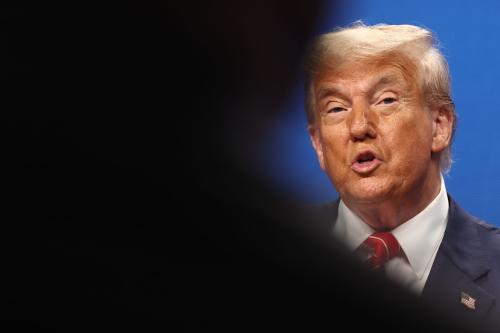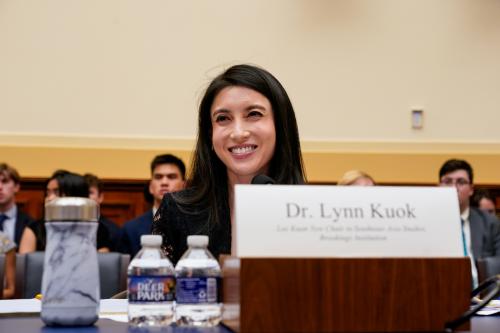After walking out on the six-party talks in 2008 and vowing never to return; after torpedoing a South Korean naval boat, shelling a South Korean island, and on numerous occasions threatening nuclear war; the regime in Pyongyang has decided to see if the atmosphere might be favorable for a new round of talks.
This early-season fishing expedition comes as no surprise. North Korea’s antics have alienated the entire world with the exception of the Chinese, who bite their lip and continue to shelter North Korea under their wing. The North Koreans need a continued infusion of foreign aid and the Chinese may be squeezing them pretty hard. After months of tension, perhaps the world will be so relieved to see North Koreans talking rather than shooting that they will take the bait.
The bait comes in the form of the January 5 “Joint Statement” carried by North Korean radio and television and released to the foreign community by KCNA in an English translation. This united front appeal purportedly comes from “the DPRK government, political parties and organizations at a joint meeting,” but of course it was drafted by Korean Workers’ Party elites and endorsed by Kim Jong-il himself. The statement proposes talks with “political parties and organizations of south Korea including its authorities.” As one would expect from the extremely hostile attitude that the DPRK government has taken toward the ROK government, the statement is insincere and insulting.
Although the statement purports to come from the government and organizations of the DPRK, it is not addressed to the ROK government, as if South Korea is a state without a government. This omission alone should be sufficient to invalidate the request for talks.
Then the statement goes on to call for “unconditional and early opening of talks between the authorities having real power and responsibility.” Who might those authorities be? Will Kim Jong-il be willing to sit down with President Lee Myung-bak, whom the North Korean media invariably refer to as a “traitor?” Will there be a seat at the table for the so-called “puppet Unification Minister Hyun In-taek,” characterized just last month as a “pathetic pro-U.S. stooge and colonial henchman”? This is a textbook example of North Korea’s Jekyll and Hyde diplomacy.
In the statement North Korea undertakes to forgive itself for its past misdeeds by offering to “meet anyone anytime and anywhere, letting bygones be bygones,” as if 60 years of armed provocations, starting with the Korean War and including countless armed attacks, abductions, hijackings, and territorial incursions (in the West Sea, the East Sea, and across the DMZ), were somehow South Korea’s fault.
What will the North Korean leadership get out of this? The delegates to the meeting are supposed to talk about “détente, peace, reconciliation, unity and cooperation.” And there it is: “cooperation”, which is North Korea code for foreign aid. The winter is long and the food supply is dwindling. China is not contributing as much as North Korea needs, so it is time to pass the hat once again.
But the regime foresees another, more immediate, reward, which is so important that it is made a precondition for the “unconditional” talks: “We propose discontinuing to heap slanders and calumnies on each other and refraining from any act of provoking each other.” Obviously the renewed effort of government and non-government organizations in South Korea to send truthful information to the North Korean people is causing considerable concern to the regime in the North. It’s good to know that one’s efforts are successful. As I have argued in the past, information should be the weapon of choice for South Korea.
If you remember the Aesop fable ― not the one about the sunshine and the north wind but the one about the boy who cried wolf ― you will understand why it is wise to be skeptical. This time around, North Korea says “we will discuss and solve all the issues related to the important matters of the nation.” But the deal-breaking nuclear issue is not mentioned. Way back in 1993 Pyongyang promised “If the United States accepts the DPRK-proposed formula of package solution [later embodied in the Agreed Framework], all problems related to the nuclear issue including the compliance with the [IAEA] safeguards agreement will be solved and it will not take much time.” Not quite.
An old Korean saying goes, “Well, let’s try to be fooled one more time since we are in the same family.” The two Koreas must one day cooperate, although I think that day still lies some years in the future. But today, China, Russia, and the United States are eager for the two Koreas to resume contact because without that contact the six-party talks, so useless yet so loved by diplomats, cannot resume. What then should Seoul do?
I am always in favor of dialogue. Let the two Koreas meet in that bare room at Panmunjom. Put a glass of water in front of each delegate. No need for expensive air travel, hotels, banquets, and the inevitable bribes disguised as gifts. Just talk. The North Koreans can say what is on their mind and the South Koreans can do the same. Past experience suggests that actually negotiating with them is useless because any agreements they make simply strengthen their regime and give it time to pursue its own agenda, which includes being a military-first power with nuclear weapons. But at the very least it is worth letting them know that they are not fooling anybody and that it is too early in the season to catch many fish.
The Brookings Institution is committed to quality, independence, and impact.
We are supported by a diverse array of funders. In line with our values and policies, each Brookings publication represents the sole views of its author(s).



Commentary
Op-edGone Fishing: A New Round of Talks Between North and South Korea
January 11, 2011